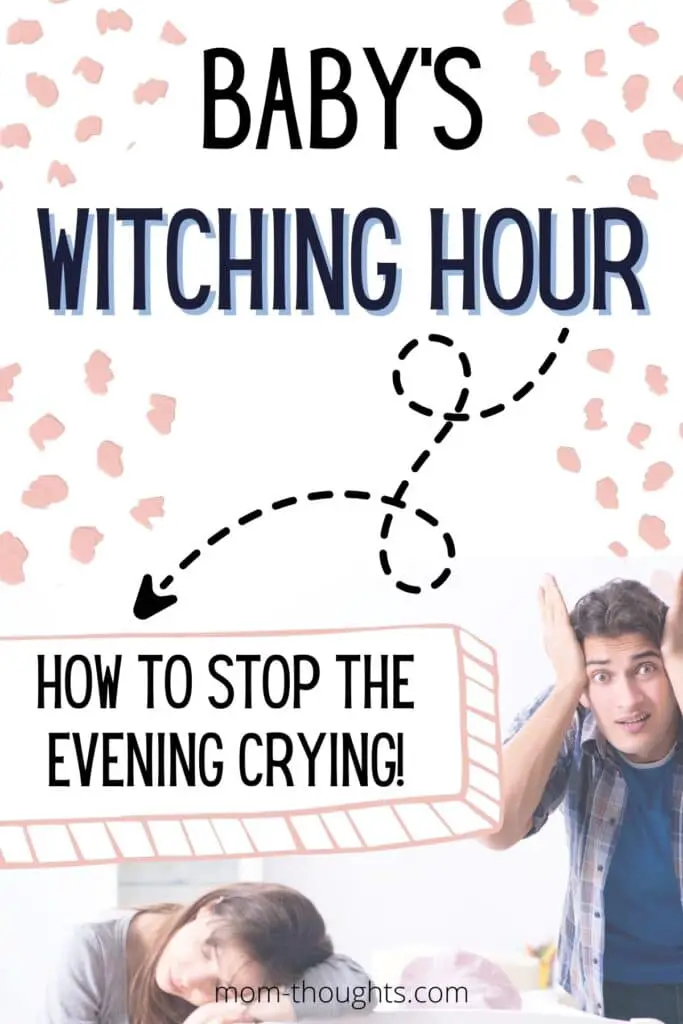
How Parents Can Help with Baby’s Witching Hour
A baby’s Witching Hour can be enough to send any parent over the edge. It typically occurs in the late afternoon through the evening. Most commonly starting around 4 or 5pm and lasting up until 11pm. It feels like a cruel joke that it starts at that point of the day where you’re already exhausted from all of your daily work and responsibilities!
The most important thing you can remind yourself of when you’re in the thick of it is that it is TEMPORARY. I repeat…it is temporary.
Most babies outgrow the terrible witching hour phase when they are around 4-5 months old. I know that may seem like a lifetime away right now, so I’m here to provide you with some helpful tips for surviving witching hour!
In order to understand the tips for coping with witching hour, it’s important to have a better understanding of what Witching Hour is, and what causes it to occur in the first place.
WHAT IS WITCHING HOUR
Witching Hour is the time of day where a baby is extremely fussy and is constantly crying and screaming, and is often inconsolable, or very difficult to soothe. A lot of parents confuse the witching hour with colic.
WITCHING HOUR VS COLIC
WITCHING HOUR: Witching hour is an extremely normal phase of a developing baby. You’ll notice that it happens about the same time every day. It starts in the late afternoon and goes into the early evening.
COLIC: A colicky baby is defined as a baby who cries for 3 or more hours a day, 3 or more days a week, for 3 or more weeks at a time. It most commonly begins within the first few weeks. With colic, your baby will typically also show signs of physical discomfort. The cries and screams will be more extreme, and you’ll notice things like arching of the back, constantly trying to change positions, and raising their knees up to their tummies.
WHAT CAUSES WITCHING HOUR
There are a number of factors that can be contributing to your baby’s witching hour, and the intensity of it. Understanding these causes will help you to be able to combat those dreaded hours each day.

Overtired
Being overly tired at the end of the day is a very common cause for witching hour. If your baby isn’t napping enough throughout the day, or perhaps they skipped a nap, it can result in your baby being exhausted when late afternoon rolls around. Pay attention to their sleeping habits, and how any alterations to their normal sleep schedule impacts their witching hour. For example, if they sleep in later in the morning, take a later nap, take a shorter nap than normal, take a longer nap than normal, etc.)
Too Much Stimulation
Over stimulation is another common cause for a baby’s witching hour. At the very least, it could be making that time of the day more intense and unbearable. There are a lot of “normal” things to us that are actually quite stimulating for a baby, and they can only handle so much on a given day. Things like too much noise, bright lighting, TV, radio, and visitors can easily over stimulate your little one.
Cluster Feeding
In preparation for bedtime, babies often do what’s called “cluster feeding”. Simply put, cluster feeding is when a baby demands a lot of short feedings within a few hours. It helps them prepare for a longer sleep. So if it seems like your baby is demanding to be fed a lot during this stretch of day…it’s probably because they are.
Gassy Baby
Tummy issues are no fun for anyone. If your baby is experiencing issues with gassiness or reflux, this could be causing or worsening your baby’s witching hour.
Environmental
Think about what your household typically looks like during those witching hours. Parents are getting home from work, you’re scrambling to get dinner on the table, packing lunches for the next day, trying to get the bath routine done for all of the kids, and so on. Our evening routines are often pretty jam packed. To a baby, all they know is there is a lot of what feels like chaos going on around them.

Okay, now that you understand what witching hour is, and what causes it…let’s start talking about how to deal with your baby’s witching hour!
As a means for providing for my family, I may earn commissions if you shop through the links on this page at no additional cost to you.
TIPS TO HELP WITH bABY’S WITCHING HOUR
TIP #1: Take Nap Time Seriously
As mentioned earlier, make sure you’re paying attention to your baby’s naps. It’s a common misconception that keeping your baby up may help them sleep better at night because they will be tired. While that may make sense in theory, the opposite is actually true. If your baby is overtired they will actually have more trouble falling asleep and staying asleep.

So do your best to keep your baby on a solid nap schedule. Plan your day around your baby’s naps whenever possible. But if it’s not possible, just remember that babies can sleep just about anywhere. Get a nice car seat cover to block out the light so they can sleep while you’re out running errands, or enjoying lunch with a friend.
Or if your baby will only nap while you’re holding them, give baby-wearing a try. That way they can nap, and you can still tackle your to-do list at the same time. (Don’t worry…you’ll get your personal space back one day mama. At least this gives you your arms back!)
Tip #2: Reduce Stimulates
Being overstimulated is challenging for a baby. You can help your little one by dimming the lights in the house and turning off the tv for a bit. When trying to minimize stimulation, you should also put away the toys that have bright flashing lights and loud noises.
Tip #3: White Noise
White noise is extremely comforting to a lot of babies. It reminds them of the sounds that they used to hear while they were in the womb. For newborns, simply being out of the womb is incredibly overwhelming. The world is full of new colors, sounds, and other stimulating things. So having a nice white noise machine can help babies relax and feel safer. This one is cool because it’s a nightlight as well and can be controlled from your phone.

Tip #4: Get Some Fresh Air
Many parents have had success with implementing a change of scenery at the start of witching hour. Strap on your Ergo Baby Carrier, or put your baby in a stroller, and go for a nice walk around the neighborhood or local park!
Tip #5: Create A Calm Environmental
If you think your hectic evening routine is impacting your baby’s witching hour, do whatever you can to make it a calmer environment. If you’re able to, prep your meals on Sunday so you can just pop dinner in the oven throughout the week.
Have one parent take the baby in another room for some cuddle time while the other parent tackles the main parts of the evening schedule.
When it comes to mastering a non-chaotic evening routine, planning is key. Plan out your evenings the day before, or even over the weekend. (I use Sunday Morning coffee time to plan out my week This Clever Fox Daily Planner has been a real game changer for me! But any planner would do the trick.)

Tip #6: Trial And Error
At the end of the day, every baby is different, and you never know what the secret ticket to peace and quiet is until you find it. So just try different things. One of the things that worked best for my baby was putting her in an umbrella stroller and simply moving it back and forth. We would put her in the stroller, and just push it back and forth with our legs while sitting on the couch. It was weird…but it worked. And that’s all that mattered!
Tip #7: Evaluate The Diet
If your baby is experiencing tummy pain or discomfort you’ll want to evaluate what they’re ingesting throughout the day. If you’re breastfeeding, take a look at your food and drink intake. Things like dairy, wheat, fish and eggs can cause tummy problems in some breastfed babies. Try eliminating one food type at a time and see if that helps.
For formula fed babies, you may want to switch up their formula. They make soy formula which is easier on the tummy. We had a lot of success when we switched our little one to Enfamil Neuropro Gentlease!
YOU MAY ALSO LIKE:
What Is Gentle Parenting and How Does It Work?
Diaper Bag Essentials – How To Pack A Diaper Bag Like A Pro
How To Set Up The Best Diaper Changing Station
What To Do When Your Baby Hates Tummy Time
5 Survival Tips For Road Tripping With A Baby
How To Make Baby’s First Easter Basket Special
Complete Guide To Formula Feeding
20 Important Questions To Ask When Choosing A Daycare – FREE PRINTABLE
